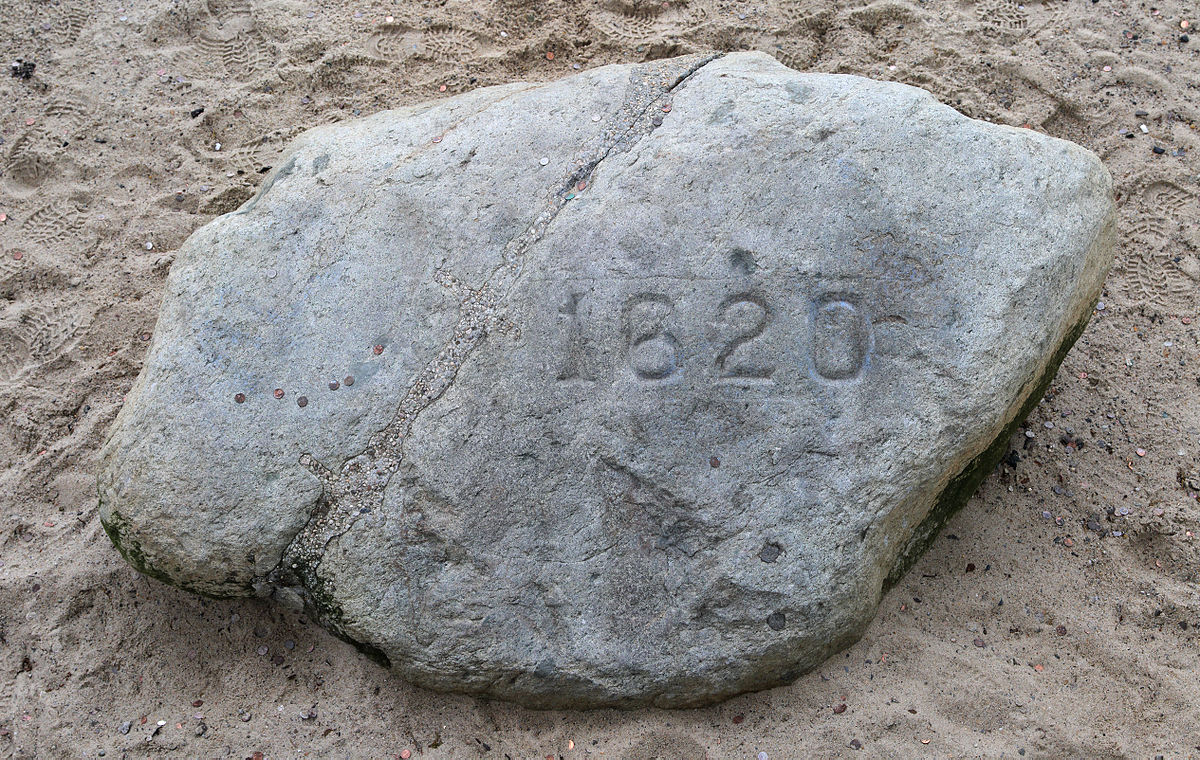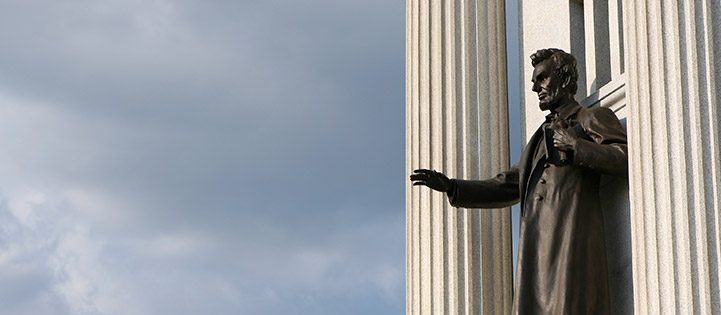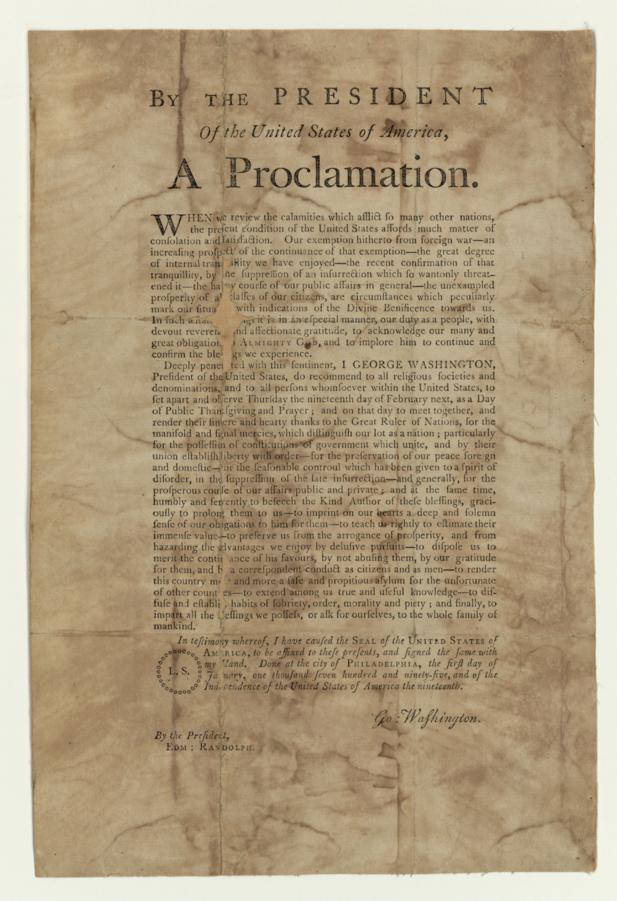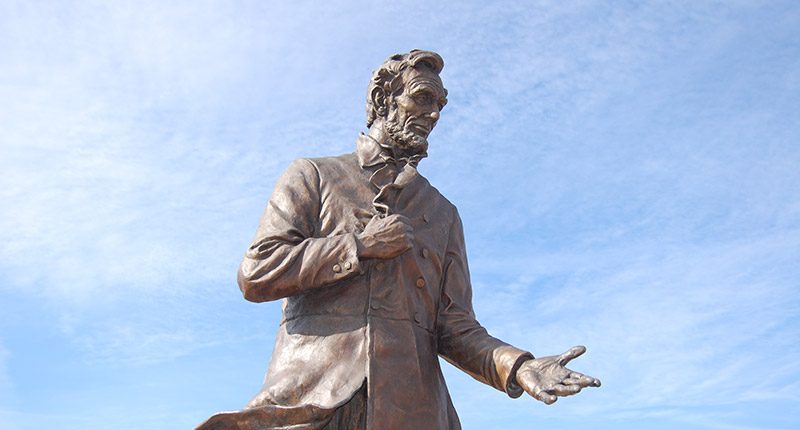Thanksgiving Wasn't Always a Source of National Unity.
Thanksgiving in the American Republic: 2018

We must not ignore our extraordinary blessings.
Americans are deeply divided. Our deep polarization makes political losses seem especially awful. It’s a grave problem: a deeply shared sense of the nation’s unity on certain fundamental principles is an important part of the common good. That unity was once focused especially on broad principles derived from the American Founding. But there is no longer a shared admiration of the Founding’s principles.
Our history and civics textbooks no longer approach the Founders with civic reverence. Reflecting the political values dominant in our contemporary universities, they are either critical of the Founders (for their alleged racism, sexism, and emphasis on economic freedom), or at best ambivalent.
In teaching my courses on Religion and the Constitution this year, I have been struck by how cavalier some modern Supreme Court justices have been in explicitly challenging the idea that the Founders should be the touchstone for constitutional interpretation. They justify their departure from original intent by doubting that the principles of the Founders deserve our allegiance. Justice William Brennan’s concurring opinion in Abington School District v. Schempp in 1963 and Justice David Souter’s dissent in Van Orden v. Perry in 2005 are notable examples.
There is no sense in papering over how deep our regime’s divisions are. At the same time, we should take care not to ignore the blessings we still have—and they are great blessings indeed. A short list would include:
The rule of law. There are examples that might make one doubt our commitment (one thinks of campus quasi-judicial actions that display no sense of its importance), but no one would rather be under the “rule of law” in China, or Saudi Arabia, or the Congo, or Brazil, or…most other places in the world, come to think of it. In many places outside the United States you get as much of the “rule of law” as you can pay for.
Religious liberty. The HHS mandate, litigation against the Little Sisters of the Poor, and the dilution of state Religious Freedom Restoration Acts at the behest of not only gay rights advocates but also big corporations, all are a cause for concern. But who won those cases? Who won the Masterpiece Cakeshop Case (even before Brett Kavanaugh was added to the Supreme Court)? And where in the world is there an educational system that contains such a broad array of truly independent religious schools?
Political freedom. True, there are grounds to worry about the outsized power of elites in our political system, particularly their domination of the universities, the intelligentsia, and the media. But outright authoritarianism is the common form of rule in countries containing a majority of the world’s population, including not only China and Russia but much of what used to be called the Third World. Where could Donald Trump (warts and all), who loves to stick his Tweeting finger in the eyes of the dominant elites, be elected? Even in Europe, where there is at last a rebellion against the dominant elites, those elites continue (at least so far) to be dominant.
Freedom of speech. Many university professors or Silicon Valley elites challenge freedom of opinion and expression today. But what country in the world allows greater freedom of speech? Do we hesitate to speak our minds, to criticize the powerful on the left or the right? And we still find outlets to do so, in journals and newspapers, on the internet, and in everyday life.
A broad scope for economic enterprise. One might point to all sorts of limits in America, whether legislation aiding too-big-to-fail banks at the expense of smaller ones or manifold occupational licensing requirements justified by little more than the desire to protect those occupations’ current denizens. Among the truly enterprising, however, who would rather conduct business in the autocracies lording over so much of the world—or, for that matter, the countries of the European Union?
Those who are most critical of America, both on the left and on the right, seem in no hurry to leave. This should reorient us toward our persistent blessings. Do they hesitate to leave because they are nobly sacrificing their preferences to their civic duty?
It’s important for us to be aware of the challenges to our fundamental principles. We will not preserve them—and perhaps restore a greater measure of them—unless we are aware of the efforts to curtail them. But if focusing so exclusively on our problems causes us to ignore our extraordinary blessings, we would be culpable of ingratitude. Today, as always, we have a deep moral obligation to thank God for those blessings, even as we fulfill our responsibilities to preserve and extend them, for ourselves and for our posterity.
The American Mind presents a range of perspectives. Views are writers’ own and do not necessarily represent those of The Claremont Institute.
The American Mind is a publication of the Claremont Institute, a non-profit 501(c)(3) organization, dedicated to restoring the principles of the American Founding to their rightful, preeminent authority in our national life. Interested in supporting our work? Gifts to the Claremont Institute are tax-deductible.
How Abraham Lincoln created Thanksgiving.
Thanksgiving remains one of our few unifying traditions.
We should be thankful for the sheer wonder of being.
The Genuinely American Debate over Federalism and Thanksgiving.
Allen Guelzo, Richard Brookhiser, Joseph Bottum, and Justin Dyer on the thought and action of Lincoln's Thanksgiving and his wrestling with God.






